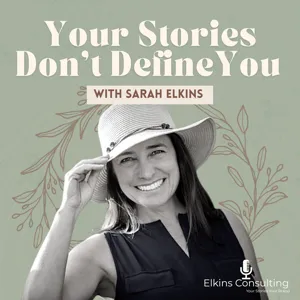Podcast Summary
Embracing the Present Moment and Change: Understand impermanence, find meaning in the present, and embrace change for growth and renewal at any stage of life
Change is a natural and inevitable part of life, and learning to accept and navigate these transitions with wisdom and resilience is essential for maintaining well-being. Whether it's the end of a significant project, the departure of loved ones, or the aging process itself, understanding the impermanence of each moment and finding meaning in the present can help us move forward with grace and purpose. As we age, we may face unique challenges, but the universal experience of change offers opportunities for growth and renewal at any stage of life. So, instead of clinging to the past or fearing the future, embrace the present moment and the wisdom it brings.
Appreciating the endings: Celebrate endings to gain clarity and approach new opportunities with an open mind and heart.
It's essential to appreciate the endings of things just as much as the beginnings. While our culture often focuses on what's next, it's important to remember that we're constantly living in the midst of endings. These endings can bring a sense of loss, but they also create new possibilities. A clear example of this is the experience of completing a significant project or achieving a goal. After the initial celebration, there can be a feeling of listlessness or uncertainty about what comes next. However, instead of focusing solely on the next step, it's crucial to acknowledge and celebrate the ending itself. This can help us approach new opportunities with a clear mind and an open heart. As the story of the chess game in Yosemite illustrates, even when good things end, we can take a breath, reflect, and move forward with curiosity and excitement.
Our brains crave for progress and anticipate positive experiences: Practicing mindfulness and trusting the present moment can counteract societal pressures and bring peace and relaxation
Our brains are wired to anticipate and crave for positive experiences while fearing negative ones, creating a constant desire for "becoming" or progress. This anticipation machine influences our daily lives, from lifting a water bottle to planning our futures. Society's focus on shoulds and end dates can reinforce these tendencies, leading to insecurity and a constant striving for more. To counteract this, practicing mindfulness and trusting the present moment can bring a sense of peace and relaxation. This shift involves letting go of the craving for becoming and leaning back to trust the flow of life. However, it's essential to make reasonable plans while maintaining this mindset. The brain's anticipation machine and our societal structures can work together to create a sense of constant striving, but being aware of this tendency and practicing mindfulness can lead to a more peaceful and trusting approach to life.
Tension between stagnation and generativity in middle age: Middle age is a time of reflection on stagnation and creating new possibilities, acknowledging losses, and embracing personal growth with ups and downs.
As we age, we may experience feelings of stagnation or disintegration, but it's important to recognize that these themes are not unique to specific ages. Instead, they are common experiences that can arise at any time. According to psychologist Erik Erikson, middle age is a time of tension between stagnation and generativity. This means reflecting on whether we feel stuck or if we're creating something new in our lives. When we face endings, whether due to aging, loss, or the natural timeline of our careers, it's essential to acknowledge the loss and celebrate what we've accomplished. Then, we should look inward to discover how our generative spirit wants to manifest in new possibilities and contributions. Additionally, it's natural for personal growth to follow an upward trend line with occasional plateaus and even backslides. Recognizing these ebbs and flows is crucial for continuing our journey toward actualization.
Embrace disintegration for growth: Disintegration periods offer opportunities for personal development and growth. Instead of fearing them, embrace and make room for the necessary process of reorganization.
Life is a cycle of growth and disintegration, and the necessary periods of disintegration provide opportunities for new integrations and growth. This principle can be observed in various aspects of life, such as language acquisition in children or the metamorphosis of a caterpillar into a butterfly. These periods of disintegration can be challenging and uncomfortable, but they are necessary for personal development. As Pema Chodron suggests in her book "When Things Fall Apart," it's essential to give ourselves the time and space to go through these processes and learn from them. Developmental psychologist Daniel Levinson also supports this idea, describing adult development as a process of organization, disorganization, and reorganization in upward spirals. So, instead of fearing or avoiding periods of disintegration, we should embrace them as opportunities for growth and self-compassionately make room for the necessary process of reorganization.
Making informed health decisions and taking care of our skin: Separate fact from fiction, seek reliable sources, maintain healthy skin with OneSkin, and recognize the value of aging with Doctor John DeLaney
It's important to avoid rushing into decisions or actions that may not serve us well in the long term, while also avoiding unnecessary prolonging of negative experiences. This concept applies to various aspects of life, including health and well-being. To make informed decisions about our health, it's crucial to separate fact from fiction and seek reliable sources of information. The ZOE Science and Nutrition podcast is an excellent resource for making smarter health choices. Additionally, taking care of our skin can significantly improve our overall well-being. OneSkin offers simple and scientifically validated solutions for maintaining healthy skin. Lastly, it's essential to recognize the value of aging and the wisdom that comes with it, rather than focusing solely on youth and appearance. The Doctor John DeLaney show provides practical advice for navigating life's challenges and offers a nice complement to the theoretical nature of Being Well.
Embracing the Value of Aging: Aging is an opportunity to focus on intrinsic values, contribute, learn, and grow, rather than feeling undervalued by society's false standards of worth based on external achievements.
As we age, we may feel invisible or undervalued in society, leading to a false belief that our worth is tied to external achievements like career or family. However, it's essential to focus on intrinsic values such as quality of life, contribution, and personal development, which become more accessible as we grow older. Society's tendency to devalue older individuals is misguided, and we should remember that our worth is not determined by our productivity or societal role. Instead, we should focus on enriching our lives through learning, growing, healing, and service. As we age, we gain practical wisdom, skill, and perspective, making this stage of life an opportunity to make a meaningful impact and continue personal growth. It's essential to recognize and embrace the value of each stage of life, rather than fearing the passing of time or the loss of societal validation.
Acknowledging past selves for personal growth: Imagine and bow to previous selves to appreciate experiences and qualities shaping us, fostering deeper meaning and connection to self.
Life's journey includes dealing with endings and making decisions about the future, both prospectively and retrospectively. The speaker shares his personal experience of facing health scares and the resulting introspection, which involved problem-solving, physical reactions, and deep feelings of gratitude and connection to life. He suggests an exercise of imagining and bowing to previous selves as a way to acknowledge and appreciate the experiences and qualities that have shaped us. This practice can help us find a deeper sense of meaning and connection to our past and present selves. It's essential to address the practical challenges and emotional aspects of life transitions while maintaining a sense of gratitude and appreciation for the journey as a whole.
Appreciating Past Selves: Recognizing and respecting past selves fosters gratitude, connection, and personal growth. Self-reflection leads to healing and renewed strength.
Acknowledging and appreciating our past selves can bring about a sense of respect, gratitude, and connection. This practice goes beyond ego and self-praise, encouraging us to recognize the qualities and efforts that have shaped us into who we are today. By looking back with appreciation, we can also identify areas for growth and move forward with a renewed sense of strength and resilience. It's a reminder to extend the same respect and gratitude to ourselves that we naturally offer to others. This practice can be challenging, but the benefits of self-reflection and appreciation can lead to healing and personal growth.
Appreciating the past and personal growth: Recognize the value of past efforts, pursue new goals, find fulfillment in mentoring, focus on personal growth and the journey
It's important to appreciate the past and the previous versions of ourselves while striving for new goals and experiences. It's easy to put off important projects or dreams, but the effort and joy derived from pursuing them is valuable, regardless of the outcome. Additionally, as we age or reach milestones in our lives, it's essential to recognize that we may have peaked in certain areas, but there's still an opportunity to give back and mentor others, finding fulfillment in the process. Overall, it's essential to focus on the journey and the personal growth that comes with it, rather than solely on the destination or the idea of constant upward progress.
Giving back and mentoring younger generations: Look for opportunities to give back and mentor, providing fulfillment and leaving a lasting impact
As we navigate the different stages of life and encounter moments of completion or transition, it's essential to look for opportunities to give back and mentor younger generations. This not only provides a sense of fulfillment and purpose but also leaves a lasting impact. Furthermore, understanding the natural patterns of integration and disintegration can help us navigate the ups and downs of life and learn from our experiences. The conventional gold rings of society, often made of brass, may lead us to constantly search for the next thing, but focusing on generativity and leaving a positive legacy can bring true satisfaction.
It's never too late to learn and grow: Don't let societal expectations limit your potential, keep learning and growing no matter your age
As we age, we often underestimate the value of our accumulated skills and experience. Society may tell us that we have less to offer as we get older, but the truth is, we're often in a better position to create what we've always wanted than when we were younger. With more resources, knowledge, and sometimes even more time, we can defy the common narrative that we have to have accomplished our goals by a certain age. It's never too late to start learning and growing, and we should not let societal expectations limit our potential. If you've enjoyed this discussion, please consider subscribing to our podcast, leaving a positive review, or supporting us on Patreon for as little as the cost of a couple cups of coffee a month. You can also find us on YouTube for video versions of our episodes. Keep growing, and we'll see you next time.





![Caffeine Cast: How To Deal With The VOICES In Your Head [Business, mindset, entrepreneur, disruptors]](https://www.podcastworld.io/podcast-images/disruptors-kt0uj0xy.webp)




